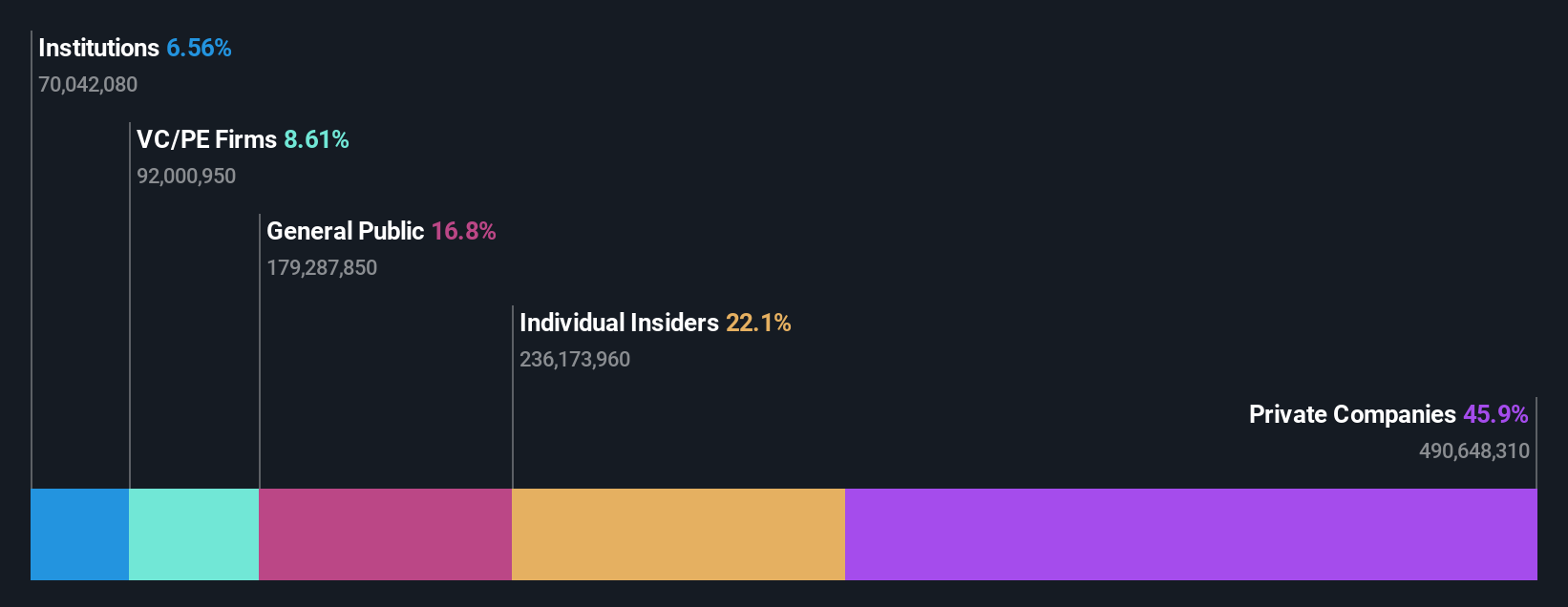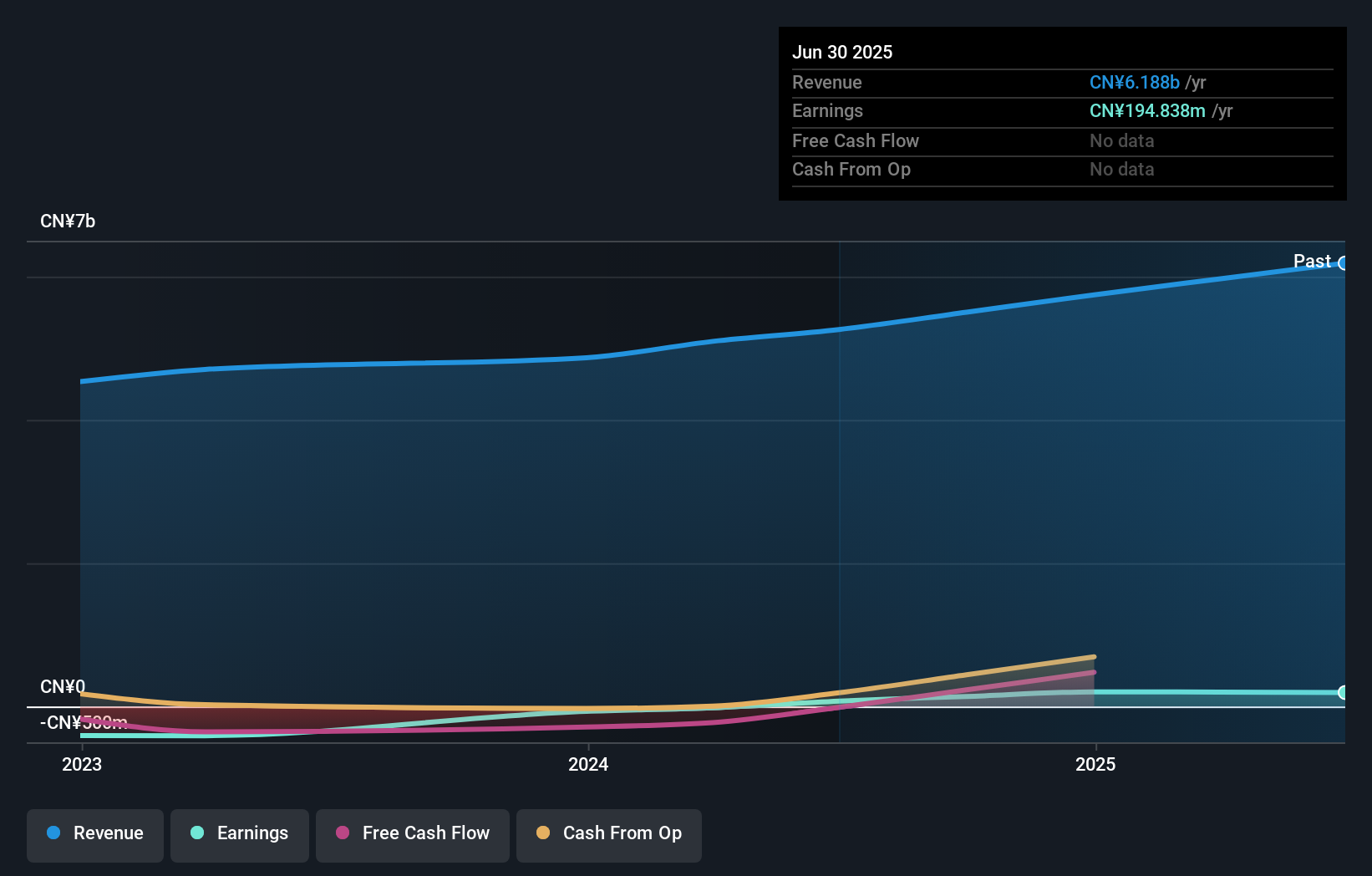Shiyue Daotian Group Co., Ltd.'s (HKG:9676) market cap rose HK$427m last week; private companies who hold 46% profited and so did insiders
Key Insights
- Significant control over Shiyue Daotian Group by private companies implies that the general public has more power to influence management and governance-related decisions
- The top 3 shareholders own 58% of the company
- Insiders own 22% of Shiyue Daotian Group
A look at the shareholders of Shiyue Daotian Group Co., Ltd. (HKG:9676) can tell us which group is most powerful. And the group that holds the biggest piece of the pie are private companies with 46% ownership. In other words, the group stands to gain the most (or lose the most) from their investment into the company.
While private companies were the group that benefitted the most from last week’s HK$427m market cap gain, insiders too had a 22% share in those profits.
Let's delve deeper into each type of owner of Shiyue Daotian Group, beginning with the chart below.
View our latest analysis for Shiyue Daotian Group

What Does The Institutional Ownership Tell Us About Shiyue Daotian Group?
Institutional investors commonly compare their own returns to the returns of a commonly followed index. So they generally do consider buying larger companies that are included in the relevant benchmark index.
As you can see, institutional investors have a fair amount of stake in Shiyue Daotian Group. This suggests some credibility amongst professional investors. But we can't rely on that fact alone since institutions make bad investments sometimes, just like everyone does. It is not uncommon to see a big share price drop if two large institutional investors try to sell out of a stock at the same time. So it is worth checking the past earnings trajectory of Shiyue Daotian Group, (below). Of course, keep in mind that there are other factors to consider, too.

Shiyue Daotian Group is not owned by hedge funds. Looking at our data, we can see that the largest shareholder is Shenyang Shiyue Daotian Enterprise Management Consulting Partnership (Limited Partnership) with 36% of shares outstanding. Meanwhile, the second and third largest shareholders, hold 12% and 9.8%, of the shares outstanding, respectively. Bing Wang, who is the second-largest shareholder, also happens to hold the title of Chief Executive Officer.
To make our study more interesting, we found that the top 3 shareholders have a majority ownership in the company, meaning that they are powerful enough to influence the decisions of the company.
Researching institutional ownership is a good way to gauge and filter a stock's expected performance. The same can be achieved by studying analyst sentiments. We're not picking up on any analyst coverage of the stock at the moment, so the company is unlikely to be widely held.
Insider Ownership Of Shiyue Daotian Group
The definition of an insider can differ slightly between different countries, but members of the board of directors always count. Company management run the business, but the CEO will answer to the board, even if he or she is a member of it.
Most consider insider ownership a positive because it can indicate the board is well aligned with other shareholders. However, on some occasions too much power is concentrated within this group.
It seems insiders own a significant proportion of Shiyue Daotian Group Co., Ltd.. It has a market capitalization of just HK$9.2b, and insiders have HK$2.0b worth of shares in their own names. That's quite significant. Most would say this shows a good degree of alignment with shareholders, especially in a company of this size. You can click here to see if those insiders have been buying or selling.
General Public Ownership
With a 17% ownership, the general public, mostly comprising of individual investors, have some degree of sway over Shiyue Daotian Group. While this size of ownership may not be enough to sway a policy decision in their favour, they can still make a collective impact on company policies.
Private Equity Ownership
With an ownership of 8.6%, private equity firms are in a position to play a role in shaping corporate strategy with a focus on value creation. Some might like this, because private equity are sometimes activists who hold management accountable. But other times, private equity is selling out, having taking the company public.
Private Company Ownership
We can see that Private Companies own 46%, of the shares on issue. It's hard to draw any conclusions from this fact alone, so its worth looking into who owns those private companies. Sometimes insiders or other related parties have an interest in shares in a public company through a separate private company.
Next Steps:
While it is well worth considering the different groups that own a company, there are other factors that are even more important. For example, we've discovered 1 warning sign for Shiyue Daotian Group that you should be aware of before investing here.
Of course, you might find a fantastic investment by looking elsewhere. So take a peek at this free list of interesting companies.
NB: Figures in this article are calculated using data from the last twelve months, which refer to the 12-month period ending on the last date of the month the financial statement is dated. This may not be consistent with full year annual report figures.
New: Manage All Your Stock Portfolios in One Place
We've created the ultimate portfolio companion for stock investors, and it's free.
• Connect an unlimited number of Portfolios and see your total in one currency
• Be alerted to new Warning Signs or Risks via email or mobile
• Track the Fair Value of your stocks
Have feedback on this article? Concerned about the content? Get in touch with us directly. Alternatively, email editorial-team (at) simplywallst.com.
This article by Simply Wall St is general in nature. We provide commentary based on historical data and analyst forecasts only using an unbiased methodology and our articles are not intended to be financial advice. It does not constitute a recommendation to buy or sell any stock, and does not take account of your objectives, or your financial situation. We aim to bring you long-term focused analysis driven by fundamental data. Note that our analysis may not factor in the latest price-sensitive company announcements or qualitative material. Simply Wall St has no position in any stocks mentioned.
About SEHK:9676
Shiyue Daotian Group
Manufactures and sells pantry staple food in the People's Republic of China.
Excellent balance sheet with proven track record.
Market Insights
Community Narratives



